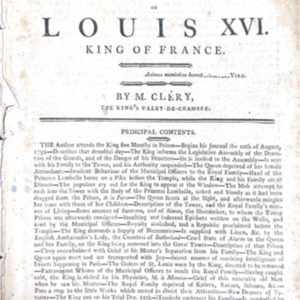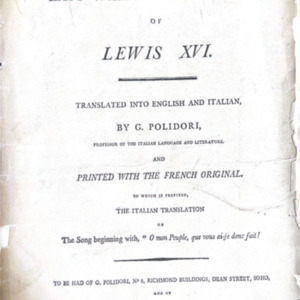In Their Own Words: The French Revolution in Print
The End of Louis XVI: The Ineffectual King
King Louis XVI was an indecisive and ineffective monarch who struggled to address France’s financial crisis and growing social unrest. His resistance to reform and reliance on absolute power alienated the common people and fueled revolutionary anger. After attempting to flee France in 1791 and conspiring with foreign powers, he was arrested and put on trial by the National Convention. In January 1793, he was found guilty of treason and executed by guillotine, marking the end of the monarchy and a turning point in the French Revolution.
These pamphlets provide a nuanced perspective on the final days of King Louis XVI, offering insight into how he was perceived not only as a symbol of tyranny but also as a complex human figure. While widely condemned for his failures and seen by many as the architect of France’s decline, these accounts occasionally reveal moments of empathy, acknowledging his personal struggles, his family, and the weight of the crown he bore. Through this lens, we see a monarch not merely vilified, but portrayed with a degree of pathos, reminding us that even those at the center of historic upheaval are not immune to fear, loss, and regret.

Written by Jean-René de Cléry, the valet who served King Louis XVI during his imprisonment in the Temple, Interesting Occurrences at the Temple offers a deeply personal and intimate account of the final months of the French monarchy. Published in 1793, this pamphlet provides an eyewitness perspective on the events surrounding the king’s captivity, as he was held under harsh conditions by the revolutionary government before his eventual trial and execution.

The Last Will and Testament of Lewis XVI
This solemn and deeply personal document was composed by King Louis XVI while imprisoned in the Temple. In it, Louis reflects on his faith, appeals for forgiveness, and expresses a desire for peace and unity among the French people, even as the Revolution he once ruled over now condemned him.
The testament is notable for its tone of humility and religious conviction. Louis affirms his Catholic beliefs, pardons those responsible for his downfall, and entrusts the care of his family to divine providence. Though politically powerless by the time of its writing, the document sought to preserve the dignity of monarchy and present the king as a martyr-like figure in the face of revolutionary justice.